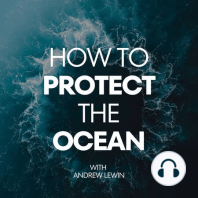32 min listen

Carbon Release from Bottom Trawling: A Concern for the Ocean that can't be ignored
Carbon Release from Bottom Trawling: A Concern for the Ocean that can't be ignored
ratings:
Length:
16 minutes
Released:
Jan 29, 2024
Format:
Podcast episode
Description
In this episode, we explore the destructive impact of trawling, an unsustainable fishing method that is contributing to overfishing and the degradation of the ocean. We discuss how trawling destroys the ocean floor and its potential effects on climate change. Additionally, we delve into a new study that reveals the significant carbon release associated with bottom trawling. This episode highlights the urgent need to address the environmental consequences of fishing practices and offers insights on how individuals can take action to protect the ocean. Link to article: https://amp-theguardian-com.cdn.ampproject.org/c/s/amp.theguardian.com/environment/2024/jan/18/carbon-released-by-bottom-trawling-too-big-to-ignore-says-study Follow a career in conservation: https://www.conservation-careers.com/online-training/ Use the code SUFB to get 33% off courses and the careers program. Facebook Group: https://bit.ly/3NmYvsI Connect with Speak Up For Blue: Website: https://bit.ly/3fOF3Wf Instagram: https://bit.ly/3rIaJSG TikTok: https://www.tiktok.com/@speakupforblue Twitter: https://bit.ly/3rHZxpc Trawling: A Destructive Fishing Method Overfishing is a major problem in the ocean, leading to the degradation of marine ecosystems. While efforts are being made to conserve fisheries and promote sustainable fishing practices, certain methods, such as trawling, remain highly unsustainable. In this episode, we delve into the destructive nature of trawling and its impact on the ocean floor, as well as its contribution to climate change. Trawling involves dragging a massive net along the ocean floor, scraping and collecting everything in its path. This method not only destroys the surrounding environment but also releases significant amounts of carbon into the atmosphere. A recent study has estimated that trawling releases approximately 370 million tons of carbon dioxide annually, making it a significant contributor to global warming. The study, conducted by a global team of climate and ocean experts, analyzed data from 1996 to 2020 and found that trawling released a staggering 8.5 to 9.2 billion tons of carbon dioxide into the atmosphere during that period. The researchers likened trawling to marine deforestation, causing irreparable harm to the climate, society, and wildlife. The carbon released by trawling not only contributes to global warming but also leads to local acidification, reducing the ocean's capacity to absorb carbon. Sediment plumes created by trawling can be seen from space, similar to vapor trails left by aircraft. The study identified trawling hotspots, including the East China Sea, Baltic Sea, North Sea, and Greenland Sea, as significant sources of climate emissions. It is alarming to note that over half of the carbon released by trawling enters the atmosphere within a decade. This means that even if trawling were to cease immediately, the carbon emissions from past trawling activities would continue to impact the climate for years to come. The study also highlighted the fact that 75% of fishing vessels are not publicly tracked, indicating that the estimates of carbon emissions from trawling may be conservative. To address this issue, the study authors emphasize the need for countries to include trawling emissions in their climate action plans. By regulating and reducing trawling activities, immediate benefits can be achieved in terms of carbon emissions reduction. Failure to take action will result in the continued release of carbon dioxide into the atmosphere, exacerbating the effects of climate change. In conclusion, trawling is a highly destructive fishing method that not only destroys marine habitats but also releases significant amounts of carbon dioxide into the atmosphere. It is crucial for countries to prioritize the regulation and reduction of trawling activities to mitigate the impacts of climate change and protect marine ecosystems.
Released:
Jan 29, 2024
Format:
Podcast episode
Titles in the series (100)
SUFB 071: 195 Countries Come To An Agreement on Climate Change Reductions: It almost seemed impossible to believe, but 195 countries got together to discuss how to reduce climate change impacts through reduction of carbon emissions. In today's episode, I go over the major points of the agreement. Spoil alert, it's not... by How To Protect The Ocean